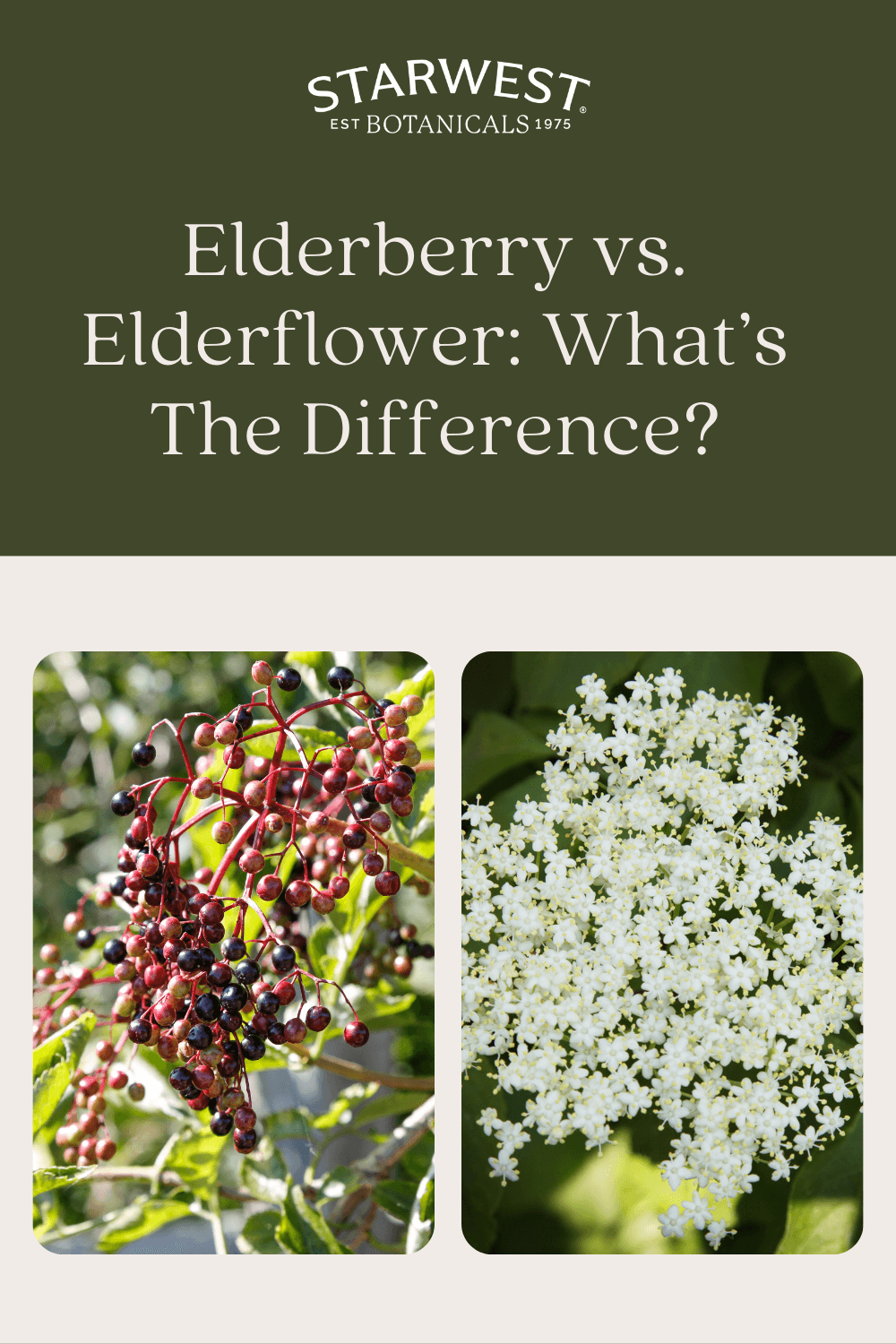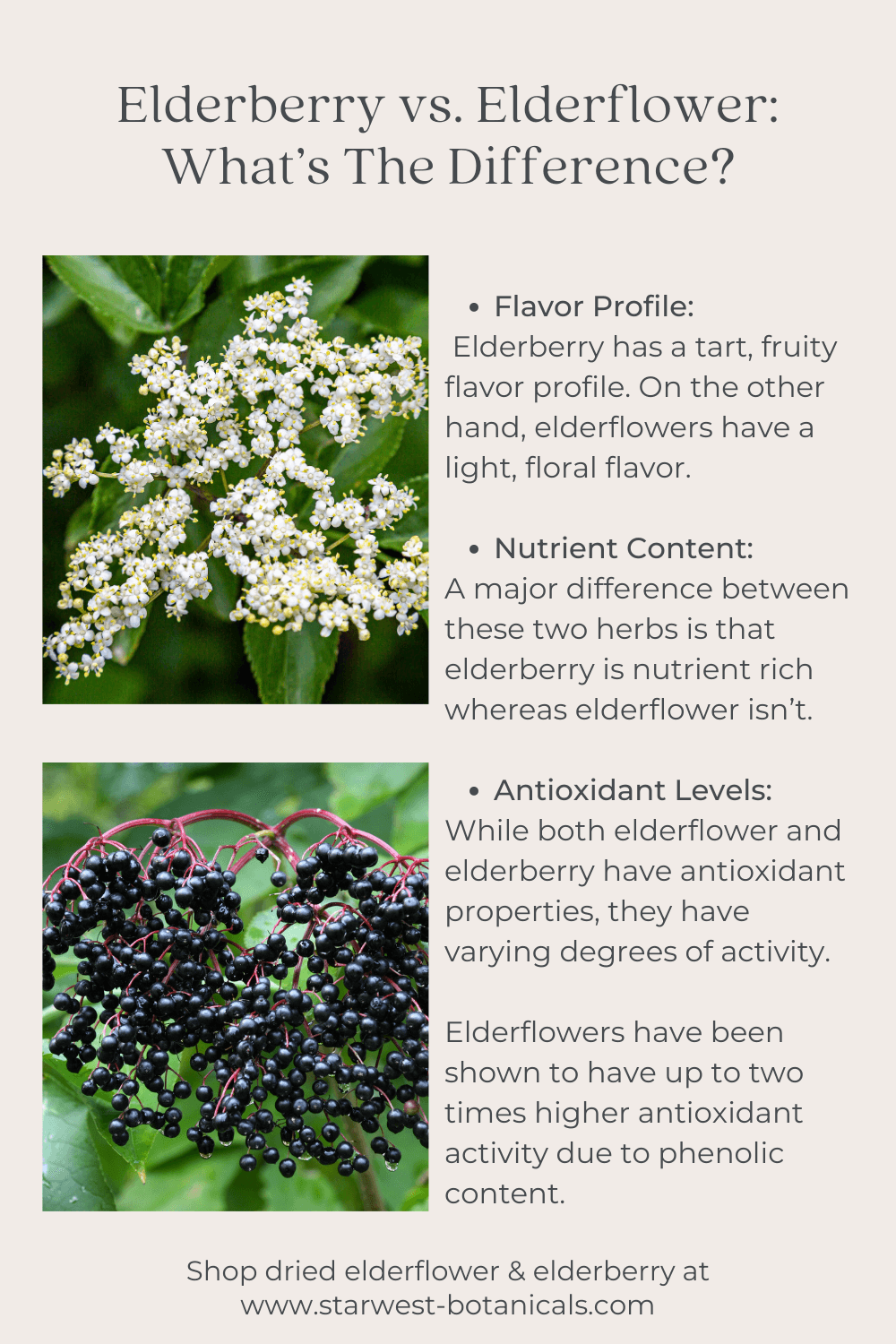Elderberry vs. Elderflower: What’s The Difference? | Starwest Botanicals
Posted by Daniel Powers on 03-22-2023

Elderberry and elderflower are two different parts of the same medicinal shrub. They are often compared to each other due to their comparable health benefits.
Before you make a decision about which herb to buy, there are a few key differences to keep in mind.
We’ll dig deep into the similarities and differences between elderberry vs elderflower in this article.
Elderberry Overview:
Elderberry is a small dark purple berry that comes from the elder tree (Sambucus nigra).
Elderberries have been utilized in traditional folk medicine for thousands of years. In European folklore, elderberry consumption was associated with increased longevity and vigor. And for good reason, elderberries are thought to provide a variety of health benefits.
Elderberry has been used as both a food and as a medicine. As a food, it’s often used in different types of jellies and jams. From a medicinal standpoint, it’s often consumed in a syrup form, though elderberry tinctures and lozenges are also available.
Potential Health Benefits of Elderberry:
Elderberry has also long been thought to offer significant health benefits.
Some potential wellness properties elderberries may have include:
- May Support the Immune System – Elderberry is known as a popular herb for immunity support, and for good reason. Research shows that Elderberry may be a beneficial herb for the immune system.
- Nutrient Rich – Elderberries are loaded with a variety of different nutrients, including vitamins and dietary fiber.
- Antioxidant Properties – Elderberries are a great natural source of antioxidants. Eating foods rich in antioxidants is thought to be helpful for slowing down the aging process and promoting overall health and well-being.
Elderflower Overview:
Elderflowers are the flowers that bloom on the elder tree (Sambucus nigra). They typically bloom in either late spring or early summer (compared to elderberries, which are typically harvested in late summer).
Elderflowers have a beautiful white, lacy appearance. The entirety of the umbel (or flower cluster) of the elderflower is edible. It’s commonly used for tea, as a food, or as a garnish. In particular, elderflower liqueur is a popular way to consume this beneficial herb.
Elderberry is used in cuisine for its delicate floral flavor.
Potential Health Benefits of Elderflowers:
Elderflower provides more than just a delicious flavor.
Elderflowers are also thought to provide a variety of different health benefits, including:
- Antioxidant Properties – Elderflowers are a rich source of antioxidants. This is due to the high phenol content in elderflowers.
- Blood Sugar Support – Preliminary lab studies have shown that elderflowers may help to support healthy blood sugar levels within the normal range.
- May Have Diuretic Properties – Traditional reports note that elderflowers have a diuretic effect on the body.
If you’re looking to support your body and fight against free radical damage, consider adding elderflowers to your daily routine.

Elderberry vs Elderflower: Similarities & Differences
When it comes to comparing elderberry vs elderflower, there are a few key similarities and differences.
Similarities:
- Antioxidant Properties – First, both elderflower and elderberry have been shown to have antioxidant activity. This makes both herbs a great option for those looking for natural sources of antioxidants.
- Ease of Adding To Routine – Another similarity is that both herbs are very easy to add to your routine. Both elderberry and elderflower are delicious to consume as either a syrup (elderberry) or a tea (elderflower).
Differences:
- Flavor Profile – Both elderberries and elderflowers are consumed for their delicious flavors. That said, elderberry has a tart, fruity flavor profile. On the other hand, elderflowers have a light, floral flavor.
- Nutrient Content – A major difference between these two herbs is that elderberry is nutrient rich whereas elderflower isn’t.
- Antioxidant Activity Levels – While both elderflower and elderberry have antioxidant properties, they have varying degrees of activity. Elderflowers have been shown to have up to two times higher antioxidant activity due to phenolic content.
Elderflower vs Elderberries: Which Is Right For You?
You may be asking, elderberry or elderflower, which is the best herb for me?
Elderberry is a nutrient rich berry with a great flavor that may help to support the immune system. It also has antioxidant properties due to its rich anthocyanin content.
Elderflower contains high amounts of antioxidants due to rich phenol content. Additionally, it’s thought to help support healthy blood sugar levels. It has also been used in traditional medicine as a diuretic.
If you’re looking for a nutrient rich herb for immune system support that’s easy for the whole family to take, then elderberry is the best option.
If you’re looking to support everyday health and provide your body with a source of natural antioxidants, then elderflower is a great option.
Can You Take Elderberries and Elderflowers Together?
Yes, you can take both elderberries and elderflowers together.
In fact, these herbs may be a helpful combination for supporting overall health and wellness. We include both elderberries and elderflowers in our immune supporting Sniffles Tea Blend.
Where to Buy Elderberries & Elderflowers?
We recommend buying elderberries from a reputable supplier.
We may be partial, but our lineup of herbs and spices includes a wide selection of both elderberry and elderflower products.
We recommend buying organic elderberries for the best experience.
How Can I Add Elderberries and Elderflowers To My Diet?
The preferred way to ingest elderflowers is typically in a tea form. Elderflowers have a delicate, floral flavor that tends to dissipate easily. Making a quick tea is a great way to get the wonderful flavors, and health benefits, of this herb.
You can also make an elderberry liqueur.
For elderberries, there are many different ways to add this berry to your routine. The primary way is to take elderberry syrup. You can also take it as a tea.
Check out our full selection of elder products below:
Conclusion:
Elderflowers and elderberries are generally well-tolerated and safe herbs to consume.
Consider testing each one before deciding which herb is best for you.
You may discover that one is superior to the other, or vice versa! Alternatively, combine them to see whether you get a synergistic effect.
Author Bio:
Daniel has a master's degree in herbal science from the Maryland University of Integrative Health. He's the founder ofThe Botanical Institute, where he writes about the health benefits of herbs.


